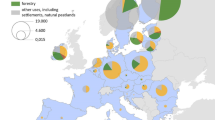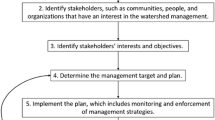Abstract
Farmers attempting to subsist in tropical uplands often rely upon unsustainable resource use practices that lead to soil erosion, declining crop yields, and a loss of soil productivity capacity. Other uses of tropical uplands, including logging and conversion of forest to rangelands, have similar results. The undesirable effects of these actions are felt on-site, at the watershed level, and even nationally. Ecological cause-effect relationships are poorly understood, and few examples exist of the successful integration of ecological knowledge with upland development. It is hypothesized that recent results of ecological research could be applied to uplands management so that stable sustainable systems of human use may be established. A second hypothesis is that statistically reliable data can be obtained from experiments in upland situations, although natural variations of soils, weather, and vegetation are great. To test these hypotheses, research involving multinational collaboration among American and Southeast Asian scientists has begun. The objective of the work is to provide credible quantitative information to help policy and decision makers and resident farmers to plan and implement improved practices based on ecological principles.
Some findings to date include:
-
1.
Ecological principles are difficult to relate to the practical context of upland agroecosystems. Indeed, the null hypothesis is necessary for planning experiments and demonstrations.
-
2.
The “signal-to-noise” ratio in these field experiments is low, and the detection of changes due to human intervention in soil erosion, nutrient movement, and plant productivity is difficult.
-
3.
Obstacles to field research in developing countries include logistic, cultural, political, and institutional factors. It is essential that local land managers participate from the start with scientific researchers in designing experiments.
-
4.
Planned collaboration among academic and government scientists facilitates design of relevant research and the implementation of results.
-
5.
The idea of ecologically based management has been well received by researchers and government officials in Asia. There is little argument with the logic of the approach.
-
6.
Pressures for quick responses to urgent problems in the uplands conflict with the need for careful, long-term, statistically valid scientific research.
-
7.
Ecological principles are vaguely understood and poorly articulated in the scientific literature. The transfer and application of ecological science to the developing world would be enhanced by clearer statements of principles.
Similar content being viewed by others
Literature cited
Carpenter, Richard A. 1980. Using ecological knowledge for development planning.Environmental Management 4(1):13–20.
Committee on the Applications of Ecological Theory to Environmental Problems, Gordon Orians, Chairman. 1986. Ecological knowledge and environmental problem solving: concepts and case studies. National Research Council. National Academy Press, Washington, DC.
Committee on Selected Biological Problems in the Humid Tropics, Jay M. Savage, Chairman. 1982. Ecological aspects of development in the humid tropics. National Research Council. National Academy Press, Washington, DC.
Conway, Gordon B. 1986. Page 23in Agroecosystem analysis for research and development. Winrock International, Bangkok.
Dover, Michael, and Lee A. Talbot. 1987. Page 4in To feed the earth: agro-ecology for sustainable development. World Resources Institute, Washington, DC.
El-Swaify, S. A., E. W. Dangler, and C. L. Armstrong. 1982. Soil erosion by water in the tropics. Research Extension Series 24, University of Hawaii Institute of Tropical Agriculture and Human Resources, Honolulu.
El-Swaify, S. A., W. C. Moldenhauer, and Andrew Lo. (eds.). 1985. Soil erosion and conservation. Soil Conservation Society of America, Ankeny, Iowa.
Forman, R. T. T., and M. Godron. 1981. Patches and structural components for a landscape ecology.BioScience 31:733–740.
Harper, David E., Daniel B. Botkin, Brian W. Mar, and Richard A. Carpenter. 1987. Applying ecology to land management in Southeast Asia. Occasional Paper No. 1, East-West Environment and Policy Institute, Honolulu, HI.
Hudson, N. W. 1980. Erosion prediction with insufficient data.In M. DeBoodt (ed.), Assessment of erosion. John Wiley, Chichester.
Hunting Technical Services, Ltd. 1985. Palawan: a strategic environmental plan. Palawan Integrated Area Development Program, Manila.
Lal, R. 1987. Managing the soils of sub-Saharan Africa.Science 236:1069–76.
Likens, G. E. 1987. Status and future of ecosystem science. Occasional Publication No. 3, Institute of Ecosystem Studies, Gary Arboretum, Millbrook, NY.
Logan, T. J., and L. R. Cooperband. 1987. Soil erosion on cultivated steeplands of the humid tropics and subtropics.In Douglas D. Southgate and John F. Disinger (eds.), Sustainable resource development in the Third World. Westview Press, Boulder, CO.
Mar, B. W., W. S. Mitter, R. N. Palmer, and R. A. Carpenter. 1987. Cost-effective data acquisition. Workshop Report No. 1, East-West Environment and Policy Institute, Honolulu, HI.
Norton, G. A., and B. H. Walker. 1982. Applied ecology: towards a positive approach. I. The context of applied ecology.Journal of Environmental Management 14:309–324.
Rambo, A. T. 1984. No free lunch: a reexamination of the energetic efficiency of swidden agriculture. Pages 154–163in A. T. Rambo and P. E. Sajise (eds.), An introduction to human ecology research on agricultural systems in Southeast Asia. EWEAPI and UPLB, Laguna, Philippines.
Rambo, A. T., and P. E. Sajise (eds.). 1984. An introduction to human ecology research on agricultural systems in Southeast Asia. EWEAPI andUPLB, Laguna, Philippines.
Ramirez, D. M. 1988. Indigenous soil conservation strategies in Philippine upland farms. Working Paper, East-West Environment and Policy Institute, Honolulu.
Risser, P. G. 1986. Landscape ecology and its implications for watershed development in the Asian/Pacific region. Presented at the workshop on Ecological Principles for Watershed Management, 7–11 April 1986, East-West Center, Honolulu.
Shaner, W. W., P. F. Philipp, and W. R. Schmehl. 1982. Farming systems research and development: guidelines for developing countries. Westview Press, Boulder, CO.
Strayer, D. 1986. Long-term ecological studies: an illustrated account of their design, operation, and importance to ecology. Occasional Publication No. 2, Institute of Ecosystem Studies, Cary Arboretum, Millbrook, NY.
Thornton, P. K., and J. B. Dent. 1987. IBSNAT crop models in a socioeconomic whole farm framework.Agrotechnology Transfer 6:1–7.
Vergara, N. T., and N. D. Briones (eds.). 1987. Agroforestry in the humid tropics. Published jointly by EWEAPI and SEARCA.
Volunteers in Technical Assistance. 1979. Pages 13–16in Environmentally sound small-scale agricultural projects. Mohonk Trust, New Paltz, NY.
Walker, B. H., and G. A. Norton. 1982. Applied ecology: towards a positive approach. II. Applied ecological analysis.Journal of Environmental Management 14:325–342.
World Commission on Environment and Development. 1987. Page 43in Our common future. Oxford University Press, Oxford.
Author information
Authors and Affiliations
Rights and permissions
About this article
Cite this article
Carpenter, R.A., Harper, D.E. Towards a science of sustainable upland management in developing countries. Environmental Management 13, 43–54 (1989). https://doi.org/10.1007/BF01867586
Issue Date:
DOI: https://doi.org/10.1007/BF01867586




